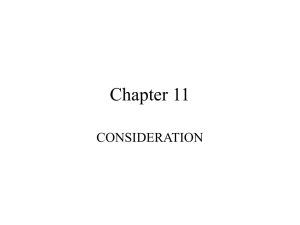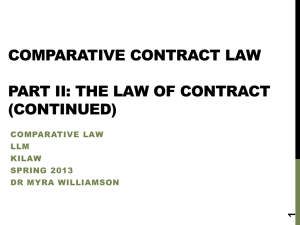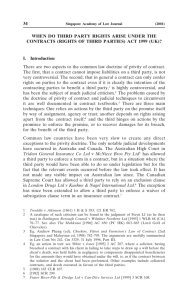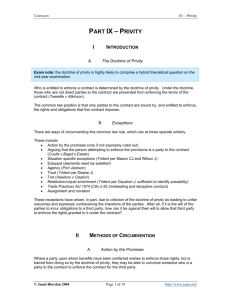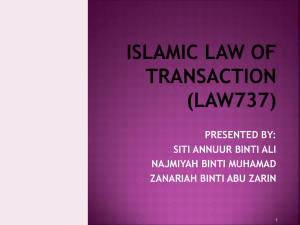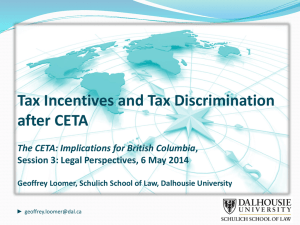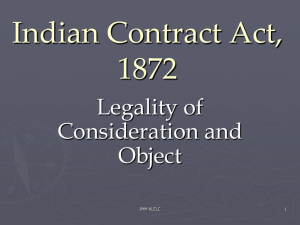consideration, intetnion and privity
advertisement
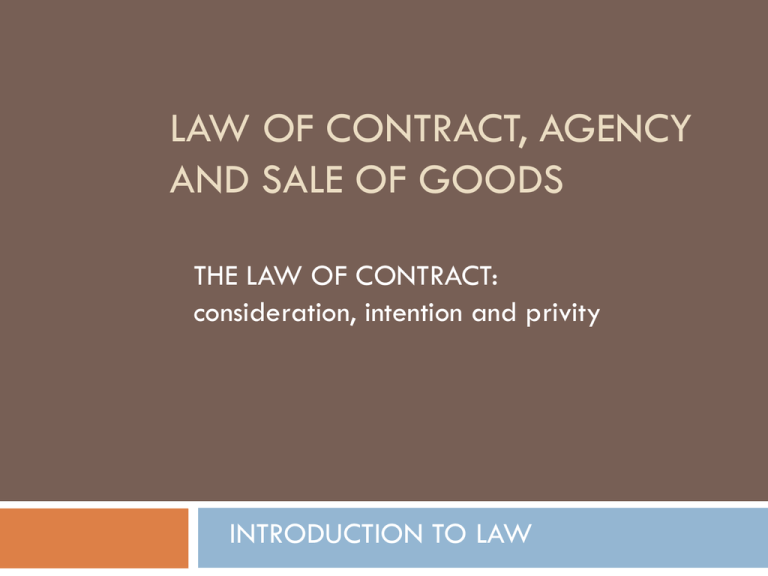
LAW OF CONTRACT, AGENCY AND SALE OF GOODS THE LAW OF CONTRACT: consideration, intention and privity INTRODUCTION TO LAW Learning Objectives 2 When you have studied this chapter you should be able to: Define consideration Recognize the circumstances when valid consideration exists Describe the operation of the promissory estoppel doctrine Appreciate the characteristics of agreements which demonstrate intention to create legal relations. What is a consideration? 3 In civil law jurisdictions, consideration is not required for a contract to be binding. In Bosnia, an ordinary contract is said to form simply on the basis of a "meeting of the minds" or a "concurrence of wills". What is a consideration? 4 Consideration is an essential in a contract. Contract is not enforceable unless each party to the agreement gets something. This “something” is called consideration – something in return What is a consideration? 5 a benefit to one party or a detriment to the other Something of value given by both parties to a contract that induces them to enter into the agreement to exchange mutual performances. "... some right, interest, profit or benefit accruing to one party, or some forbearance, detriment, loss or responsibility given, suffered or undertaken by the other." What is a consideration? 6 "An act or forbearance of one party, or the promise thereof, is the price for which the promise of the other is bought, and the promise thus given for value is enforceable." What is a consideration? Examples 7 P agrees to sell house to Q for $ 100,000. What is a consideration? Examples 8 The first person's consideration would be the house, which this person would be giving up to the other person in accordance with the contract. The second person's consideration would be the payment for the house, which might be in the form of money, traded services, or other goods. Both parties have legal consideration and the contract will be considered good if it is challenged in court. What is a consideration? Examples 9 When you buy a DVD recorder from a shop, the benefit you receive is the DVD recorder, and the detriment is the money you pay the shop. The shop clearly enjoys a corresponding benefit, and suffers a corresponding detriment in taking your money and parting with the DVD recorder. TYPES OF CONSIDERATION 10 Executory consideration Executed consideration Executory consideration 11 Consideration is called "executory" where there is an exchange of promises to perform acts in the future: e.g. a bilateral contract for the supply of goods whereby A promises to deliver goods to B at a future date and B promises to pay on delivery. If A does not deliver them, this is a breach of contract and B can sue. If A delivers the goods his consideration then becomes executed. Executory consideration 12 M promised to sell his mobile phone to K for €100 and K promised to pay the price upon delivery by M. Here, the promise to sell is in return to promise to buy. The consideration in such a contract consists of the mutual promises and is described as ‘executory’ because the promises have not yet been executed (performed). Executed consideration 13 This is where the offeror promises something once the offeree does something The promise only becomes enforceable once the offeree has done the action Executed consideration 14 If Jane loses her dog and offers to pay a reward to the person who finds it, she does not have to pay until someone finds her dog and returns it to her e.g. in a unilateral contract where A offers £50 reward for the return of her lost handbag, if B finds the bag and returns it, B's consideration is executed. Executory v. Executed 15 Executory consideration consists of two promises Executed consideration consists of one promise followed by some action Forbearance 16 People tend to think of consideration as some kind of action which is done However, not doing something (ie forbearance) can also be consideration For example, Tim has the right to sue Bob over some matter. Bob promises to pay Tim some money if Tim gives up his right to sue Forbearance (cont.) 17 This would create a valid contract because Tim giving up his right to sue is consideration His is not going to take action Rules governing consideration 18 Consideration must not be past Consideration must muve from the promisee Consideration must be sufficient Consideration must not be past 19 If one party voluntarily performs an act, and the other party then makes a promise, the consideration for the promise is said to be in the past. The rule is that past consideration is no consideration, so it is not valid and cannot be used to sue on a contract. Consideration must not be past 20 For example, A gives B a lift home in his car. On arrival B promises to give A £5 towards the petrol. A cannot enforce this promise as his consideration, giving B a lift, is past. Exception to this rule: If something is done in a business context and it is clearly understood by both sides that it will be paid for, then past consideration will be valid. See: Re Casey's Patents [1892] 1 Ch 104. Consideration must be sufficient 21 Consideration must be of material value, capable of assessment in financial terms. (Any legal right has a financial value.) Consideration may be sufficient without being adequate. Example: Ali agrees to sell a car worth $2,000 for $200. Ali’s consent to the agreement was freely given. The agreement is a contract not withstanding the inadequacy of consideration. Other rules for consideration 22 Performance must be legal Eg our example of the hitman in an earlier class Performance must be possible A promise to perform an impossible act cannot create a contract Intention to create legal relations 23 Intention to create legal relations 24 In must be shown that the parties to the agreement intended to be legally bound by the agreement. Intention to create legal relations 25 Intention to create legal relations Intention to create legal relations Social and domestic agreements Business or commercial agreements (Presumption – parties do not intend legal relations (Presumption – parties do intend to create legal relations Domestic agreements 26 Courts will presume that agreements between friends and/or family members are not intended to be legally enforceable. Domestic agreements 27 Examples: No intention to create legal relations existed in an agreement under which a husband working abroad promised to pay maintenance to his wife in England. Nick asks Kim to go to dinner at the Sunset Restaurant at 7:00 PM on Saturday. Domestic agreements 28 Example: Mr B promised to pay his wife £30 per month. Mr B had to return to Germany. Mrs B was to remain in England for medical reasons. The couple later separated. Mrs B claimed £30 per month pursuant to Mr B’s promise. Domestic agreements 29 Issue: Did this promise by a husband to his wife amount to a contract? Domestic agreements 30 Decision: An agreement to pay £30 per month existed. The parties had not intended it to be legally binding. There is a presumption that domestic arrangements are not intended to finish up in court. Commercial agreements 31 Courts will presume that agreements arrived at in a commercial context are intended to be legally enforceable. Privity of contract 32 Privity of contract 33 Privity is the term that describes the relationship between parties to a contract The rule of privity means that only parties to a contract have rights under the contract Contracts generally do not affect third parties or strangers to the contract Privity of contract 34 Tweddle v Atkinson (1861) William Tweddle was engaged to marry Miss Johnson. The fathers of the happy couple contracted that they would each put up a sum of money when the marriage took place, but Mr Johnson died before making payment. Privity of contract 35 Tweddle v Atkinson (1861) Held: William had no right to sue Mr Johnson’s estate for the money since he had provided no consideration for the promise and was merely a beneficiary of the contract. As a mere beneficiary, William was not privy to the contract : he was not truly a party to it because he was not contributing to the consideration. QUESTIONS 36 Summary 37 Consideration The bargain element which distinguishes a contract from any other sort of agreement, legally binding or otherwise. material benefit gained/detriment arising from performance of a contract. Price paid for the other party’s promise or act. Benefit/detriment. Summary (cont.) 38 The rules of consideration It must not be past: not precede the promise to pay. It must be sufficient: represent some detriment/benefit though not necessarily an adequate price. Generally, only a party who provides consideration may enforce the contract (see Privity, below). Summary (cont.) 39 Intention to create legal relations The parties to a contract must intend it to be legally binding or it will not be enforceable in the courts. An agreement between friends or family members is presumed not to reflect that intention, while business agreements are. Summary (cont.) 40 Privity of contract Generally, the doctrine of privity of contract prevents anyone except a party who contributes to the bargain from enforcing it. Summary (cont.) 41 Reading 42 Chapter 5 Page 82 : “THE LAW OF CONTRACT: consideration, intention and privity”


